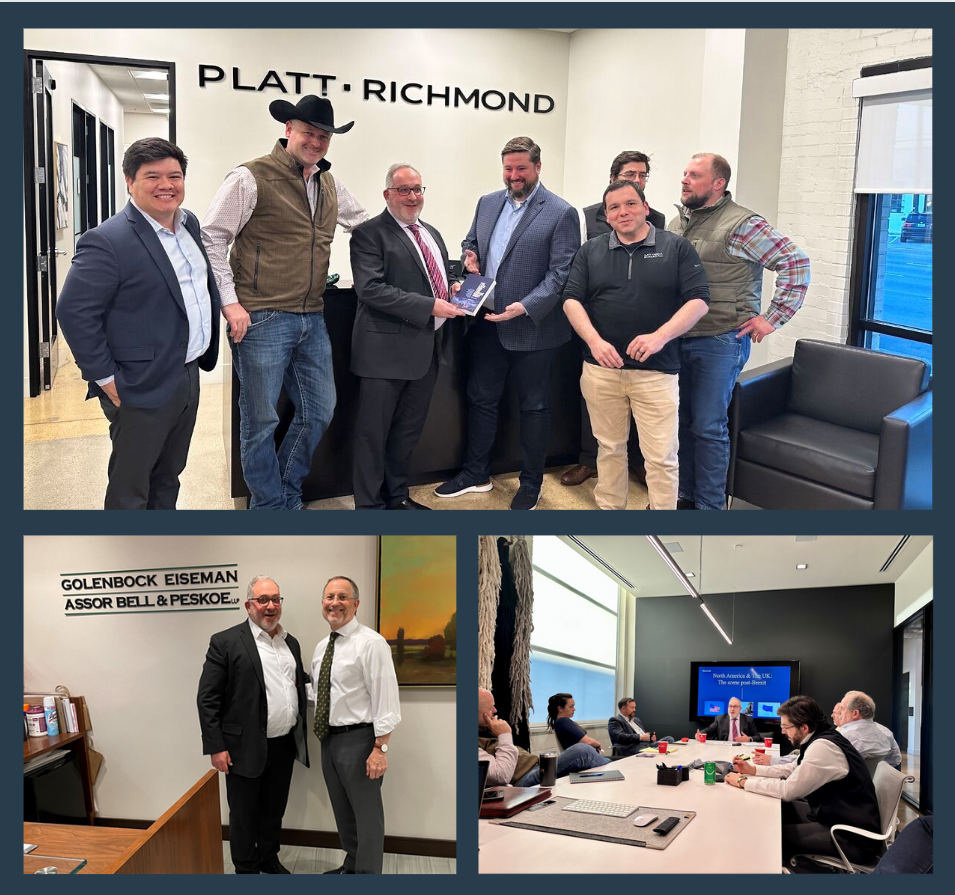Personal tales from the wild side: the lawyers’ survival guide to Covid-19, with reflections from legal practitioners and industry specialists from across the globe – summary of a recent IBA webinar. Written by guest contributor Charles Dew.
Sherrards’ Paul Marmor and Sophie Hudson deliver a truly global webinar to over 90 countries. Paul Marmor is an officer with the IBA’s Law Firm Management Committee and, with the help of Sophie Hudson, he presented a webinar addressing the Covid-19 crisis and covered the impact of the virus on law firms and lawyers across the world, with a live audience from over 90 countries. There were several thousand attendees registering to be on the webinar, making it one of the largest legal webinars of its kind, on any subject. The discussion kicked off with moderator Paul Marmor, LFMC Co-Outreach and Education Officer and Head of Litigation at Sherrards Solicitors LLP, based in London, highlighting the complexity of the current situation and the “challenges at every level” from both a personal and business perspective, impacting those from the top to the bottom of the legal profession – but, as Paul said, there is plenty of support out there, especially from the IBA, which we would consider in this presentation. He then introduced Publishing Editor of the Legal 500, David Burgess, who stressed that despite the doom and gloom, it was important to keep an “element of perspective” given that lawyers are “not key workers”. However, he was clear on the “absolute chaos” of the current situation and the issue faced by businesses of being unable to effectively plan ahead. David went on to raise two key points arising from conversations with General Counsels and in-house legal teams, namely the use of their trusted advisor law firms and the cross-border element to their work. He stressed that this is a “critical moment for every law firm in terms of their client relationships” and that “every single law firm has to step up … and make sure they are servicing clients correctly”. He was clear that while some firms had been responsive and met this challenge “incredibly well”, others had “dropped the ball, were absent and partners not responsive enough”. He went on to explain that despite clients being unlikely to switch provider in the current climate due to a lack of resources, there would be some who would look to take on different advisors in due course. David further outlined the business development opportunity presented by General Counsels’ with multi-jurisdictional operations facing issues they would not have faced before. Shifting the conversation to a more macro-focus, Paul asked Moscow-based Robin Wittering, a partner with Egorov, Puginsky, Afanasiev & Partners, for his take on current events in Russia. Robin outlined that Covid-19, in combination with a recent history of sanctions, meant that Russia faces “a real crisis” in regard to infrastructure, civil order, finance, debt and trading which has only been exacerbated by the recent oil price shock; Lenin’s quote that “there are decades where nothing happens; and there are weeks where decades happen” seemed particularly apt. Asked for his view on what would happen over the remainder of 2020, Robin responded by saying that “country by country, progressively non vulnerable, non-aged parts of the population would go back to work because the global economy can’t take more than two or three months of this” and to anticipate “an emerging markets crisis driven by the oil price”. He is currently advising clients on “how to get through the next few months” and on how to approach “the next wave of the virus”. Describing lock-down conditions in Russia, he pointed to people being confined in their homes, requiring a special permit to go out and work and how Russia was still several weeks behind Italy, France and the UK. Several clients were even building hospitals for their staff, given the essential importance of resources and production to the Russian economy. Crossing continents to North America, specifically to Washington DC, Executive Director of the National LGBT Bar Association, D’Arcy Kemnitz, spoke about the impact of Covid-19 on the LBGTQ+ community and explained that they “are working pay check to pay check” and “are the people in greatest economic jeopardy”. Paul raised the point of LBGTQ+ persons being forced to return home to families who may be hostile, to which D’Arcy responded by asking “why would we just assume that our families are accepting of who we are? If they were, we would probably have far less discrimination throughout the world and indeed throughout the legal profession”. She made clear that while the LBGTQ+ community were “celebrated at the international bar” there was a stark contrast with figures coming from the US which found that while “7% of youth identify as LBGTQ+ … LGBTQ+ youth without homes are 40%” of the total number of young homeless. She stressed how isolating it was for people to return to homes who might “claim to love you” but who “don’t respect who you are” and the dreadful situation not just in the US but increasingly in less tolerant nations for a community at “huge risk of self-harm and suicide”. D’Arcy recommended visiting Dr. Caitlin Ryan’s ‘Family Acceptance Project’ for resources relating to the matter. She further drew a parallel between the current Covid-19 situation and the AIDS epidemic, in that “plagues drive change” and how “compassion and empathy” will serve the LGBTQ+ community now as it did then. Calling on people to take “good care of one another”, D’Arcy was hopeful that “people will choose the side of celebrating differences” and will “tend and befriend” going forward. Paul reminded us that the IBA is of course an umbrella organisation and that we were pleased to have D’Arcy on board representing the LGBTQ+ community, who are an integral part of the IBA community. Speaking from Madrid, Moray McLaren, Partner at Lexington Consultants, pointed to how less pollution had meant that “weather has changed totally” to continuous rain and that they were now in their seventh week of lock down. Moray’s view was that it would be a “very difficult process to transition back” to normality without a process of testing and tracing. On the topic of law firms in Madrid, he characterised them as feeling “cautious but confident” and that they do not foresee redundancies or a need to reshape given their “very good year last year” and having “lines of credit worked out with the bank”. From a global perspective he explained that, depending on a firm’s geographic location, there were two key questions being asked: “how do we work differently?” and one from clients asking firms “how can you help us at this moment?”. He also found that we are also starting to see that firms entering week two or three of lockdown were experiencing a “cashflow crisis”, with cash flows reduced by “20% – 30%” in some cases. This was not due to a reduction in work but instead due to clients “holding on to money”. For those law firms seeking greater stability the questions became “Are there opportunities here? What are the practice areas to promote? How do they think more strategically about where they are going? How do we transition back?”. Moray also found this was a period which Managing Partners were finding “very lonely at the top of the organisation” and that they were “having to dig into reserves and energy to motivate people around them”. Horacio Bernardes Neto, President of International Bar Association, speaking from the grand setting of The Cathedral Basilica of the National Shrine of Our Lady Aparecida in Brazil, talked of the “terrible” situation in big cities “with less resources”, not enough places in hospital and people “dying on the streets”. However, in smaller cities he affirmed that there had been remarkably few cases if any, which was testament to the success of social isolation. Nonetheless, as a result of Covid-19, Horacio’s expectation was that “Brazil will go backwards by 10 years” and that there were no guarantees things would ever be the same again. Regarding restrictions on travel, Horacio was glad for technology but hopeful that the 2020 Annual Conference would go ahead as planned; he reiterated that the IBA is principally about “gathering people for networking”. On working life, Horacio stated that “this is the time to be in touch with clients” and to “serve them marvelously”. As a final positive note, Horacio highlighted that the “IBA has 120 projects going on and everyone is working well”, “membership is increasing” and that the council was in a “very strong” position with “good financial reserves”. He was also pleased to see that in Brazil there has been “an enormous increase in people helping each other”. Moray followed Horacio by suggesting we were seeing “a more human profession” and that perhaps law will become less hierarchical. An interesting question was then raised by audience member Bill Barton, Director at Barton Legal Limited: “If change brings innovation then is the coronavirus an opportunity for the legal profession?” Switching to the client perspective, David then welcomed Marilu Capparelli, MD Legal at Google EMEA, based in Milan, who provided an overview of the situation in Italy, noting that they had been the first country to “impose a nationwide lockdown”, had the “highest number of Covid cases after Spain and the US” and at this point could “not be moved into the next stage of easing restrictions”. Speaking from the experience of Google’s shift to working from home, Marilu expressed that “Covid-19 is not a marketing opportunity for anyone” and that instead “law firms should make themselves useful” and “focus on the needs of stakeholders and customers”. She reiterated Horacio’s point that this is the “the right time for lawyers to stay touch with their clients” and how much she appreciated “newsletters and emails on Covid-19, relating to new legislation” and on “each aspect of the law that could be impacted by the emergency”. Using the field of litigation as an example, she stated how she had found it very useful when law firms explained items such legislative decrees and new suspensions of terms. She also mentioned the significant opportunity presented to law firms in the startup and innovation sector, where one could enjoy “an opportunity phase for physical disintermediation and the greater demand for high tech solutions”. David then asked Marilu for her view on the change experienced by law firms relating to working practices. She suggested that this change applied to all businesses and expected as a client “a boost in the adoption of technology” and that law firms “would seriously consider their digital transformation” which she would consider key in this moment and for the coming years. It is also important to let people know “which problems you can solve with the technology” and advised that law firms create surveys and questionnaires asking clients to express their legal needs. On the topic of legal fees, she noted the importance of “working efficiently” with clients and that there would be a need to think about adapting fees to suit the crisis. Nonetheless she stressed that currently the “the immediate reduction of fees is not my priority”. Talking about the challenges of moving a global firm with 45 offices to remote working, Chris Hinze, Global Head of Communications at Hogan Lovells (also located in Washington DC), mentioned that as the crisis had progressed, the firm had “picked up lessons from each jurisdiction” and had brought into play previous experiences of natural disasters in Japan and the US. Nonetheless it had been a huge change for Hogan Lovells to transition in ten days from 500 people working remotely to 5,000 people. The move had required major resources across “back-end plumbing and infrastructure”. From a people perspective, the firm’s approach has always been to be “open and transparent”, and in the current crisis that approach has remained, albeit this time concerned with issues such as travel restrictions and office closures. Chris relayed a report from Edelman highlighting that behind health professionals, employers are the “most trusted organisation to respond effectively” to the crisis. Therefore, employees were looking to employers “to give accurate, relevant, useful information about what you and your business are doing”. Trust is therefore “a very high value item” and if you have been trusted by employees before the crisis “they will trust you on this”. To ensure continued trust, transparency and connectedness, Hogan Lovells have “built from scratch an entire dedicated intranet” which features guides on remote working relating to topics as varied as technology support and wellbeing resources. The firm is also active in relaying briefings between partners and the company CEO to employees and has created social media pages on Facebook and Instagram for employees to share their stories. Paul then introduced the two Co-Chairs of the IBA’s Law Firm Management Committee, Stephen Bowman (Managing Partner of Bennett Jones, Toronto) and Rolandas Valiunas (Managing Partner of Ellex, Estonia). On personal challenges Stephen spoke about the crisis connecting “everyone together” and when asked about the hierarchies found in law firms, Rolandas expressed the view that while the youngest are “much more capable” regarding IT communications and are subsequently better prepared, “the mature generation” will have no choice but to move towards the challenges of new technology. Indeed, this move has “already happened”. Moray cautioned that there had also been a huge learning concerning those firms where lawyers could work from home, but support staff were unable to do so. For those who are isolated at home under local restrictions, particularly those who live alone, Stephen stated that “you need to find the people within the firm who have a connection to them – whether as friends, as colleagues or simply in a purely office working relationship – and encourage them to reach out and keep in touch.” Commenting on the impact on his children, Rolandas felt that they had learnt new skills that meant “they will be much better prepared for life”. Ning Zhu, Managing Partner of Chance Bridge Partners in Beijing, then discussed the situation in China and how serious it had become by early February. She spoke movingly about how “everyone was worried” and working from home, not knowing what had happened or how long the situation will last. There was also concern due to the lack of new business, with the only real projects relating to cross border transactions and others “closed down”. Fortunately, from March, the situation has improved with the government encouraging “business to gradually come back to work” resulting in 30-35% of businesses coming back. Ending the webinar on an upbeat note, Ning had two positive messages, the first being that the number of people who are infected is coming down and secondly, from a lawyer’s perspective, since the start of March her firm has received several inquiries from clients. This encouragement was reiterated by Paul, who relayed that “while company commercial work was still a bit slower, litigation work was starting to come on board”. The webinar can be viewed at: https://www.ibanet.org/a-lawyers-survival-guide-to-Covid-19.aspx Register for Part 2 of this webinar series which will take place on the 9th June, by clicking here. Written by guest contributor Charles Dew.




